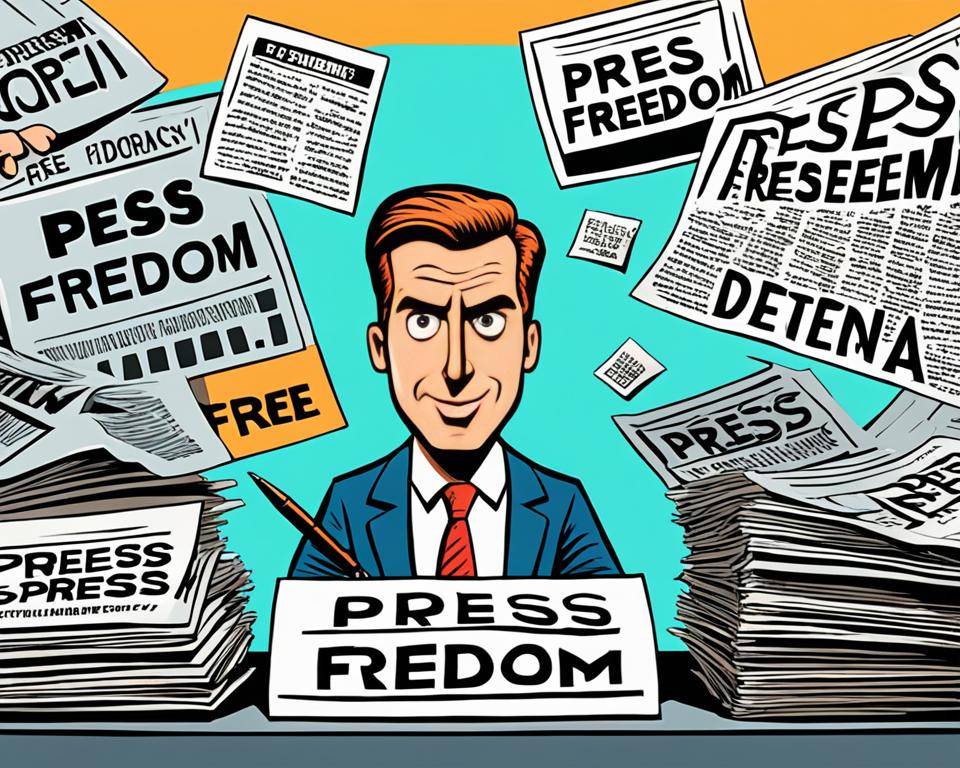The United States Constitution is a topic that has been explored in numerous films throughout history. From historical dramas to thought-provoking documentaries, there is a wide range of movies that delve into different aspects of the Constitution and its significance. This curated list presents some of the best movies about the Constitution, providing viewers with gripping narratives and insights into the principles and ideas that shape the foundation of the United States.
Table of Contents
The First Amendment – Freedom of the Press.
One of the core principles of the United States Constitution is the protection of freedom of the press. This fundamental right ensures that the media can operate without undue interference from the government, allowing for open and transparent communication to the public. In a democratic society, a free and independent press plays a crucial role in holding those in power accountable, providing essential information, and facilitating the exchange of ideas.
Several movies have skillfully explored the topic of freedom of the press, shedding light on its significance and the challenges faced by journalists. These films offer thought-provoking narratives that showcase the impact of a free press on society.
The Post (2017)
The Post, directed by Steven Spielberg, is a gripping historical drama that tells the story of The Washington Post’s decision to publish classified information known as the Pentagon Papers. This bold move exposed government secrets and ignited a national debate on the freedom of the press. The film explores the immense pressure faced by journalists and the crucial role they play in safeguarding the public’s right to know.
Selma (2014)
Selma delves into the historic Civil Rights Movement in the United States, specifically focusing on the Voting Rights Act of 1965. While the film primarily explores the fight for equal voting rights, it also highlights the role of the press in disseminating crucial information and inspiring public awareness and action. The courageous journalists depicted in Selma demonstrate the power of the press in bringing about social change.
Citizen Kane (1941)
Considered one of the greatest films in cinema history, Citizen Kane addresses the complex nature of media ownership and its influence on the news. Through the portrayal of an influential newspaper magnate, the film emphasizes the importance of an unbiased press and raises questions about the responsibilities that come with the immense power wielded by media tycoons.
These films provide audiences with compelling narratives that emphasize the First Amendment’s significance in preserving an informed society and empower viewers to value and protect the freedom of the press.
The Second Amendment – The Right to Bear Arms.
The Second Amendment of the Constitution has sparked much debate over the years regarding the right to bear arms. This fundamental right, enshrined in the Bill of Rights, has been the subject of intense discussions and controversies.
One film that explores the complexities and challenges surrounding the Second Amendment in contemporary society is “Gran Torino.” Directed by and starring Clint Eastwood, this thought-provoking drama tells the story of Walt Kowalski, a retired autoworker and Korean War veteran who becomes entangled in a clash with a local gang.
“Gran Torino” delves into the themes of self-defense, personal responsibility, and the moral dilemmas associated with the use of firearms. Through the character of Walt, the film presents different perspectives on the right to bear arms and examines its consequences in real-life situations.
Another film that touches on this topic is “Tank,” a 1984 action-drama starring James Garner. This movie follows the story of Sergeant Major Zack Carey as he resists an unjust government attempt to confiscate his personal tank, the symbol of his independence.
Comparison of Films Touching on the Second Amendment
| Film | Year | Director |
|---|---|---|
| Gran Torino | 2008 | Clint Eastwood |
| Tank | 1984 | Marvin J. Chomsky |
| Dirty Harry | 1971 | Don Siegel |
| … | … | … |
These films prompt viewers to examine the nuances of the Second Amendment, considering personal rights, public safety, and the responsibilities associated with gun ownership.
While films like “Gran Torino,” “Tank,” and “Dirty Harry” provide fictional narratives, they contribute to the ongoing debates surrounding the Second Amendment and serve as catalysts for discussions on gun control, individual liberties, and the role of firearms in society.
The Third Amendment – Protection Against Quartering of Soldiers.
The Third Amendment of the Constitution, which prohibits the quartering of soldiers in private homes without consent, is a rarely cited section of the document. However, it has still been explored in films such as The Patriot (2000), which tells the story of a South Carolina widower who reluctantly joins the Revolutionary War after his family is targeted by British soldiers.
This film highlights the importance of personal liberty and the protection of private property.
Films that Explore the Third Amendment
| Film | Year | Director |
|---|---|---|
| The Patriot | 2000 | Roland Emmerich |
The Fourth, Fifth, Sixth, and Seventh Amendments – Protection of Individual Rights.
The Fourth, Fifth, Sixth, and Seventh Amendments of the Constitution play a vital role in safeguarding various individual rights. These amendments ensure essential protections such as privacy, due process, and the right to a fair trial. Through thought-provoking narratives, films delve into the complexities and challenges of the legal system, shedding light on the importance of protecting individual rights.
Important Films:
- “Minority Report” (2002): This dystopian thriller explores the Fourth Amendment’s protection against unreasonable search and seizure. Set in a futuristic society where crimes are predicted before they occur, the film raises questions about the balance between security and individual privacy.
- “The Client” (1994): Based on John Grisham’s novel, this legal drama focuses on the Fifth Amendment’s guarantee against self-incrimination. It follows a young boy who becomes the target of powerful forces after witnessing a mob lawyer’s suicide.
- “12 Angry Men” (1957): This classic courtroom drama delves into the Sixth Amendment’s right to a fair trial. Twelve jurors must deliberate and reach a unanimous decision in a murder case, showcasing the challenges of justice and the power of reasoned deliberation.
- “Philadelphia” (1993): Tom Hanks delivers a powerful performance in this emotionally charged drama that explores the Seventh Amendment’s guarantee of a trial by jury. The film follows a lawyer battling AIDS who takes on a discrimination case against his former employer.
These films provide viewers with compelling insights into the legal system and the protection of individual rights. They serve as a reminder of the importance of upholding these constitutional principles in a fair and just society.
Continue reading the article to discover more about the Constitution and its influence on movies.
The Eighth Amendment – Protection Against Cruel and Unusual Punishments.
The Eighth Amendment of the Constitution safeguards individuals from excessive bail, fines, and cruel and unusual punishments. Throughout history, films have explored the ethical implications of punishment, raising important questions about the limits imposed by the Eighth Amendment. One such film is “12 Monkeys” (1995), which takes place in a dystopian future where the protagonist is subjected to various forms of cruel and unusual punishment. This thought-provoking film serves as a reminder of the importance of protecting individuals from dehumanizing treatment.
Other movies delve into similar themes surrounding the Eighth Amendment. “Dead Man Walking” (1995) tells the powerful story of a nun counseling a death row inmate, highlighting the moral dilemmas surrounding capital punishment and challenging the notion of cruel and unusual punishment. Additionally, “Sleepers” (1996) explores the long-lasting effects of childhood trauma and institutional abuse.
By examining the issue of cruel and unusual punishments through the lens of these films, viewers are prompted to reflect on the ethical boundaries of punishment and the impact it has on individuals and society.
Movies that explore the Eighth Amendment:
- “12 Monkeys” (1995)
- “Dead Man Walking” (1995)
- “Sleepers” (1996)
The Ninth and Tenth Amendments – Reserved Rights.
The Ninth and Tenth Amendments of the Constitution address the issue of reserved rights. These amendments were added to clarify that the Constitution did not deny or disparage other rights not explicitly mentioned.
Films such as Enemy of the State (1998) and The Free State of Jones (2016) touch on the importance of individual rights and the role of citizens in protecting their freedoms. These films shed light on the broader implications of the Ninth and Tenth Amendments.
Films exploring the Ninth and Tenth Amendments
| Film | Release Year |
|---|---|
| Enemy of the State | 1998 |
| The Free State of Jones | 2016 |
Conclusion.
Movies about the Constitution provide valuable insights into the history, principles, and ongoing debates surrounding the United States Constitution. These films offer thought-provoking narratives that encourage viewers to reflect on the importance of the Constitution and its impact on society. Whether through historical dramas or contemporary thrillers, movies about the Constitution serve as a reminder of the enduring relevance of this foundational document.
One of the core themes explored in these films is the freedom of the press, as showcased in movies like “The Post,” “Selma,” and “Citizen Kane.” These films depict the critical role of a free press in a democratic society, sparking discussions on the First Amendment.
Other films address individual rights protected by the Fourth, Fifth, Sixth, and Seventh Amendments. “Minority Report,” “The Client,” “12 Angry Men,” and “Philadelphia” shed light on the complexities of the legal system and the protection of individual rights such as privacy and a fair trial.
Movies about the Constitution also explore less commonly cited sections, such as the Third Amendment in “The Patriot” and the Eighth Amendment in “12 Monkeys.” These films delve into the importance of personal liberty and protection against cruel and unusual punishments.
In conclusion, movies about the Constitution invite audiences to engage with the principles and ideas that shape the foundation of the United States. Through gripping narratives and thought-provoking scenarios, these films leave a lasting impression and call attention to the enduring relevance of the Constitution in today’s society.


